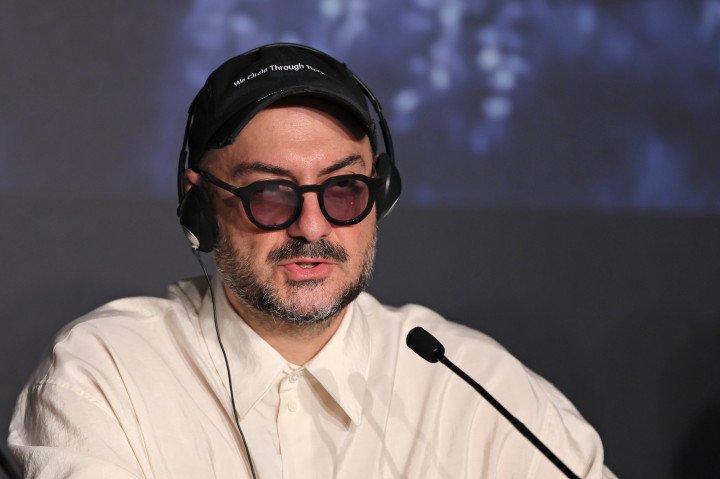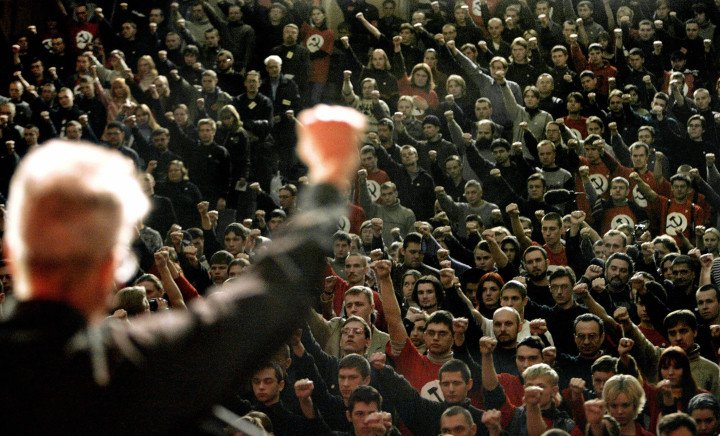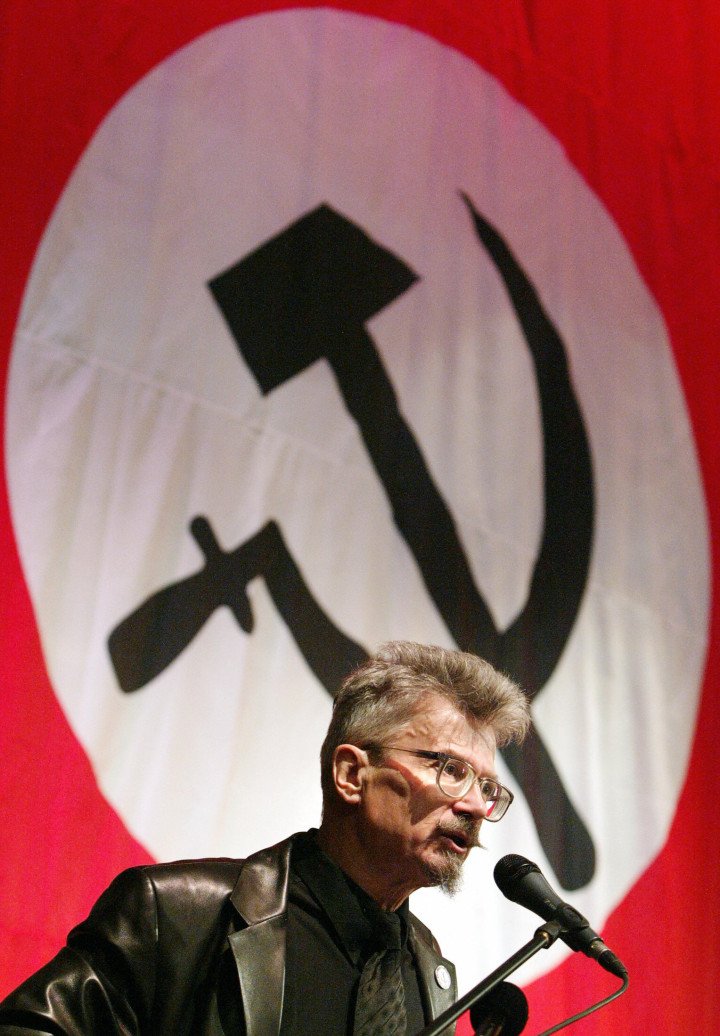- Category
- Anti-Fake
Who is Russian Fascist Eduard Limonov, and Why Are Many Critical of the New Film About Him?
-96203b7844b4035061a09a588ca1b57e.jpeg)
Eduard Limonov, the central character of a new film that made headlines a few months back, left behind a legacy marked by xenophobia and racism, a pan-Russian expansionist vision, and violent actions that followed. But did the film address that?
On May 19, 2024, over two years into Moscow's full-scale invasion of Ukraine, the Cannes Film Festival, renowned for its artistic merit and social commentary, premiered “Limonov: The Ballad” by Russian film director Kirill Serebrennikov. This caused widespread backlash amongst Ukrainians, who were all too familiar with the film's central character's work, life, and ideology.

But this wasn't Serebrennikov’s first brush with Ukrainian ire. In 2022, during the premiere of his “Tchaikovsky's Wife,” outrage sparked when the filmmaker pleaded for lifting sanctions on Russian oligarch Roman Abramovich, defended Kremlin ideologue Vladislav Surkov, and called for support for Russian soldiers and their families alongside Ukrainian war victims.
“Artists have to help these people, and I do so myself,” Serebrennikov said.
Rock and roll delusion celebrates a warmonger
What image does Serebrennikov’s film offer of the deceased Russian fascist Eduard Limonov? After all, the film is aimed at a foreign audience, so why wouldn’t it present a comprehensive look at the destructive figure?
“Poet, punk, exile, political leader…” says Screen Daily.
“The Russian radical, poet, dissident, emigré, returnee, detainee, bête noire and cause célèbre who in 1993 co-founded the ultra-nationalist National Bolshevik Party,” mentiones Variety.
“Kirill Serebrennikov’s exhilarating punk-poet biopic,” Deadline’s headline says.
A “punk poet” is the common name the reviewers assume for Limonov, and no wonder: the Russian director seems to have delivered only part of what was promised—“switchblade waving poet, a lover of beautiful women, a warmonger, a political agitator and a novelist who wrote of his own greatness.”
Thus, viewers are presented with a controversial rebel, a charismatic “dissident” rock star, an underdog, and a lost soul who lived a tumultuous life. A few of those “lucky” to know this so-called “rock star” couldn’t help but point out the film’s persistent glossing over the Limonov-militant-Russian-fascist, the Limonov-warmonger, the Limonov-genocide-hungry-imperialist.
Even if the viewers are somehow informed of these aspects of Limonov’s persona, they are “only mentioned in the postscript titles over the closing credits.”
It is hard to even gauge the extent of the film's whitewashing when the on-screen character bears little resemblance to the real Limonov. As one review described it:
“If one were to dilute a Molotov cocktail enough to make its destructive capabilities null and void, it would be the equivalent of Kirill Serebrennikov’s [film].”
So, who is the “hero” of Serebrennikov's new film?
Eduard Limonov gained notoriety in the 1990s in Russia through “Limonka,” described by Radio Free Europe Free Liberty as “an extremist ultranationalist newspaper.” “Limonka” was the mouthpiece of the National Bolshevik Party, a fringe group and “Russia's oldest radical youth organization.” It was co-founded by Limonov and fellow fascist Aleksandr Dugin. The party was a mix of Soviet nostalgia and militant nationalism. Limonov's vision was hammer-and-sickle-wielding skinheads.

Limonov’s worldview is well-known thanks to the man himself—Limonov loved to write about Limonov. The man craved a return to a bygone era when Stalin hadn't stopped with the deportations of Caucasians. He called for the eradication of entire ethnicities—Chechens, Croats, Latvians, Crimean Tatars, and many others.
“‘Bad’ peoples exist,” he wrote in a 1995 article titled “Blacklist of people.”
“Russia has no friends. While we cherish our allies, our enemies—whether courageous or despicable—must be either pacified or eradicated. Our ancestors knew this. In 1830, General Yermolov expelled the Ingush, stating, ‘The Ingush are beyond redemption.’”
Limonov strongly supported Serbia and worked closely with a sniper patrol in Bosnia during the Yugoslav Wars. Polish filmmaker Paweł Pawlikowski's documentary film shows Limonov visiting Sarajevo's front lines in 1992, firing a machine gun toward the besieged city. Next to Limonov stood Radovan Karadžić, the Bosnian Serb president, guilty of genocide in Srebrenica, war crimes, and crimes against humanity, convicted by the International Criminal Tribunal for the former Yugoslavia.
Limonov’s exile from the Soviet Union in the 1970s, living abroad in the United States, France, and other European countries (until his return to Moscow in 1991), gained him a "dissident" status. His criticism of both Russia and the West and active participation in Russian affairs through his writings and public statements reinforced it.
"Europeans are so timid they remind me of sick and elderly people," he once told The Guardian. "In Russia, fortunately, the people still have some barbarian spirit. But Europeans and Americans are just dying, sick invalids."
This "dissident" status persisted throughout Limonov’s life, especially due to his calls for a radical and confrontational approach to Russian politics, his anti-Putin stance, and numerous imprisonments for charges ranging from illegal weapon purchases to sparking anti-government rallies.
He was known as a "famous Kremlin critic,” becoming even more outspoken with the creation of the opposition party "The Other Russia" in 2006, which included former world chess champion Garry Kasparov. However, Limonov and Putin did eventually find common ground.
"Some of [Putin’s] political actions in recent years deserve applause," wrote Limonov in his LiveJournal in 2015.
"For Crimea, on a five-point scale, I give him a ten. For the support of the uprising in the Donbas—well, a three, because he supported it, but he didn’t have enough determination to bring it to a logical end, to Novorossiya (New Russia)."
Limonov was born in the Ukrainian city of Kharkiv, but in his eyes, Ukraine was a historical mistake carved out of Russia's rightful territory.
“I would add to Russia those regions that will fit: Donetsk, Luhansk, Kharkiv, Zaporizhzhia, Kherson, Mykolaiv, Odesa. Maybe I would consider Dnipropetrovsk,” Limonov said in 2014 in an interview with the Russian propaganda outlet ura.ru.
“The thing is, we need to hurry up and take everything we can before Ukraine joins NATO.”
Limonov supported the Russian aggression in the east of Ukraine, visited the occupied cities of the Luhansk Region, and formed the Interbrigades movement consisting of his loyal Nazbols (National Bolsheviks) to fight against Ukrainian forces.
Limonov died in 2020, leaving behind a legacy marked by xenophobia and racism, a pan-Russian expansionist vision, and violent actions that followed.
A “dissident” on a “dissident”
Many have said that Serebrennikov’s portrayal of Limonov begs scrutiny. In an interview with Russian news site Meduza, he offers a surprising response:
"It's unbearable to make a movie about a man who shoots at people. I just don't want to know about this part of his life."
Serebrennikov didn’t want to turn much attention to a lot of things—neither Limonov’s Balkan War participation nor the support for Russian terrorism in Ukraine. He readily admits someone else should probably handle those. Serebrennikov’s true fascination lies with the fascist's artistic side.
“I remembered the raw emotion from the first reading of his literature, from the novel It’s Me, Eddie,” he says, listing Limonov’s works.

“All these struggles of the so-called ‘Russian soul’ interested me more. Therefore, most of the film is a New York epic and parting with Yelena (his wife).”
Pawlikowski, initially set to lead the project as writer-director, stepped back after three years, scaling down his involvement. He explained that he became disenchanted with the character and didn’t like Limonov “enough to make a movie about him.” Serebrennikov, on the other hand, pressed on with his vision.
“Limonov is like the Joker,” the filmmaker explains.
“A person who has inner pain, fragility, vulnerability: he is a poet.”
Such selective focus on Limonov's artistic side ignores the real consequences of the man's ideology, and, ironically, seems to mirror its protagonist’s lifelong quest: to mythologize himself.
Cannes' Silence: Ignoring Ukrainian voices?
The Cannes Film Festival’s still decided to platform Serebrennikov’s “Limonov: The Ballad” despite many Ukrainian voices that have criticized its problematic portrayal.
"Disconnected from the reality, connected to Russian money would be a proper motto of this Cannes Film Festival," quips “Desaturated” director Marina Stepanska at the film’s premiere. She is not alone in her disapproval. Critics argue that the film romanticizes a Russian imperialist figure, with the festival endorsing narratives that ignore current geopolitical realities. Ukrainians took to the Cannes Film Festival's official platforms to voice their opposition.
“A film dedicated to the leader of the Russian Bolshevik and fascist party, by a director who defends Russian oligarchs and Russian soldiers at the Cannes Film Festival. And this is not a joke or a dream!”
“Shame on this team and curator who provide them the power of voice.”
“Limonov: The Ballad”'s oversimplified and fictionalized depiction of a fascist appears to epitomize a larger issue with Serebrennikov’s perspective.
“Serebrennikov stated that ‘Russian culture has always been anti-militaristic and anti-war,’” said the Ukrainian Institute, responding to the Russian director’s speech at the panel in 2022.
“Such generalization is, of course, completely false. A great many Russian cultural icons, from Dostoevsky to Brodsky, have been outspoken chauvinists, especially when it came to Ukraine. Kirill Serebrennikov himself is living proof that Russian culture is, more often than not, pro-war and may be used quite effectively to whitewash Russia’s aggressive expansionism.”
“Volcano” director Roman Bondarchuk pointed out in his message to the international community that “Those [Russian] artists who are critical of Putin have shown extreme passivity.”
“They did nothing to stop this war or to speak out against it before it began. And now their attempts to sign collective letters and resent the sanctions look hypocritical.”
Russian culture, for all its artistic merit, has too often been a tool of imperialism, and selective sanitized portrayals like Serebrennikov’s film perpetuate a dangerous disconnect from reality. Such a perspective, particularly at a time when Ukraine is fighting an existential war, delivers a one-sided and incomplete story, furthering the marginalization of Limonov’s victims’ voices.


-29a1a43aba23f9bb779a1ac8b98d2121.jpeg)
-4d7e1a09104a941b31a4d276db398e16.jpg)
-46f6afa2f66d31ff3df8ea1a8f5524ec.jpg)
-3db1bc74567c5c9e68bb9e41adba3ca6.png)

